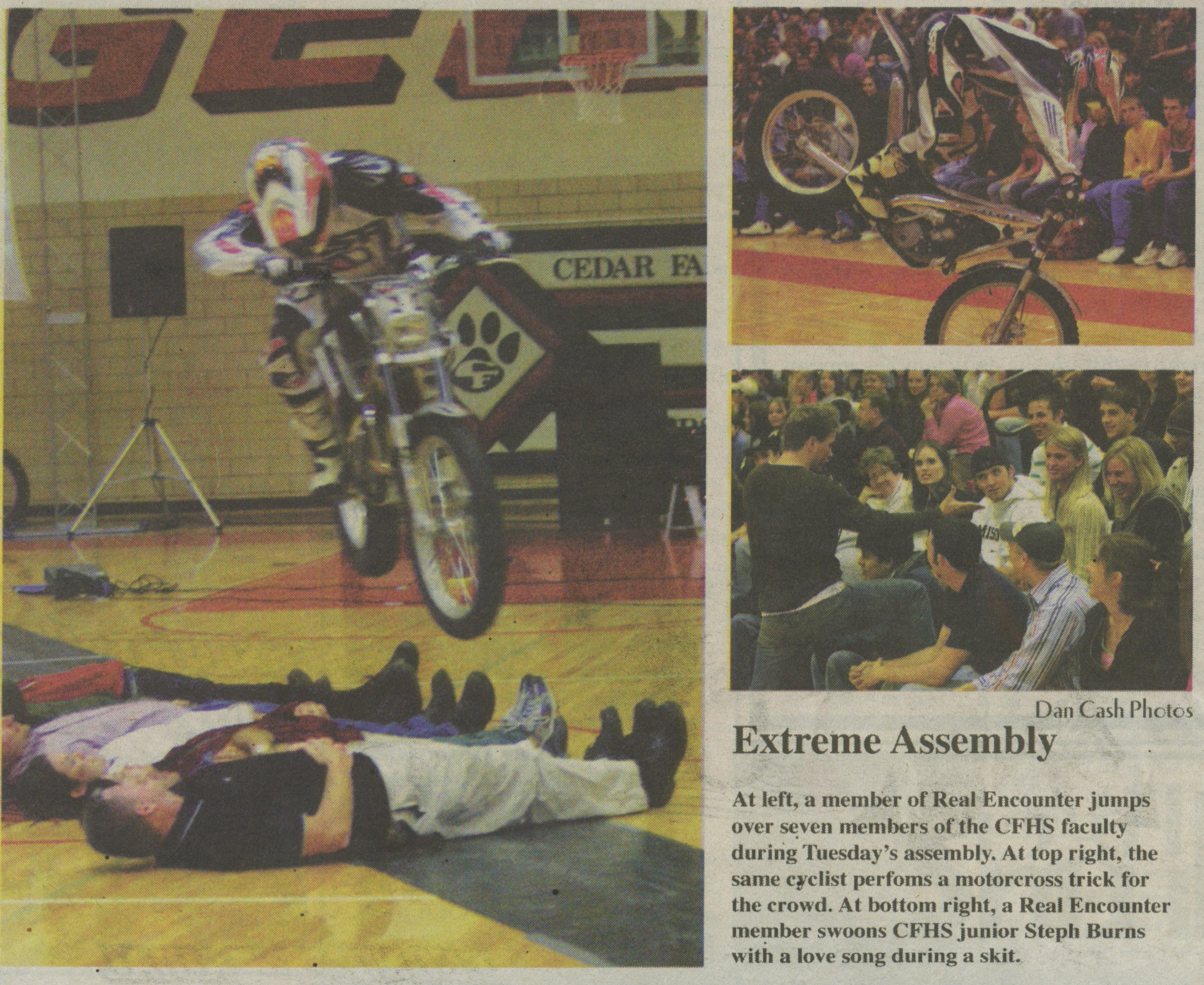Real Encounter assembly sparks controversy among high school
An invitation extended at the mandatory Real Encounter assembly on tuesday, Feb. 8, has proved to be controversial among the students and staff at teh high school. The assembly, complete with water guns, “exteme” stories and the promised motorcycles (jumping over random staff members,) tied these terrifying aspects into a lesson on power and good decision-making. While the assembly seemed innocent enough for the majority of the 50 minutes, it was soon a topic of heated controversy. During the last five to 10 minutes, the group repeatedly invited the students to a bike show and concert on Wednesday night. In response, a handfull of kids (primarily ALPHA students) walked out of the assembly. A quick glance at the Real Encounter group’s website, realministry.org would reveal the cause of this unexpected protest.
Real Encounter is, according to the website, “an evangelism strategy developed to hlp you reach people where they are and equip them with the tools need to reach their world for Christ.” This strategy includes school assemblies with invitations to what their website calls a “Harvest Night.” While many saw no problem with this mission statement, other believed that bringing an openly evangelist group to a mandatory assembly at school with invitations to a Christian event seriously blurred the lines separating Church and State.
Although the majority of CFHS students still considered the group’s message to be ultimately secular and positive, a sizable number found serious faults in the assembly and how it was conducted.
Of these students, some wre angry about the group’s religious affiliation and the fact that they were allowed to promote a Christian event. Others were upset that this assembly was mandatory when so many others had not been. But most students who opposed the assembly thought it was the combination of the two ideas that was most offensive and inappropriate. “It’s not so much that it’s a Jesus thing or that it’s mandatory, but that it’s both,” senior Ian Lippold said.
According to CFHS Principal Dean Dreyer, however, the assembly was only mandatory because of “what the message was going to be.” He said, “We were told it was going to be about the power of the individual,” and he added, “We have a lot of students who need to set goals and who could benefit.” As to the questionable religious aspect, Dreyer said there was “nothing in their message about (evangelism). (Guidance counselor Marty) Port talked to their representatives and approached me.” Port, who is the adviser for PLAAD, refused to comment for this article.
Dreyer further defended this point by saying, “There have been instances where we’ve brought individuals sponsored by the church who have spoken of messages relevant to teens, but no religion.” But when the sponsors themselves say on their website that “all the conferences we sponsor are for a larger purpose — to inspire authentic connection with God through Jesus Christ,” it inispired more than a few raised eyebrows in the direction of the church and state laws when such a “conference” is promoted at an assembly in a public school.
Some CF students did more than just raise eyebrows; they walked out the the assembly in protest. While there was a bit of organization involved, junior CH Champ said the protest sprung up mostly because of “the reality of the situation. It was something we felt compelled to do.”
Naturally, their actions received mixed reviews. Jenny Adamson, a guidance counselor at the high school, said, “Many students thought it wwas a good assembly and enjoyed it, but I feel a lot of compassion for the students who felt it was inappropriate. It took a lot of courage for them to walk out.”
Expectedly, not everyone agreed on this point. Junior Aditi Rajendran, who didn’t particularly like the assembly herself, said it was still “disrespectful for them to get up and leave like that.” She said, “There are better ways to disagree with something, like writing letters of signing petitions.” Senior Josh Parks agreed. “I think it was disrespectful because (the assembly) had nothing to do with Christianity, and they were just trying to entertain, but people walked out anyway.”
However, some saw a different goal for the assembly. According to senior Lucy Kenealy, who was a strong supporter of the assembly and participated as an “encourager” on Harvest Night, the group had an entirely different mission. “The point of Real Encounter is to bring Christianity into schools in a discrete way,” she said.
Clearly the group succeeded. Not only did the Hi-Line feature an article on the assembly without any knowledge or mention of the group’s religious mission, but had Real Encounter been less discreet, the school administration wouldn’t have let them come. Dreyer said he was caught off guard when the focus of the assembly shifted to promoting their “outreach night.” He said, “We didn’t know they were going to do that; we would have said, ‘No.'”
But some students drew a connection between the discretion on this level and deceit. Junior Nate Anderson, who is also a PLAAD member, said he thought it was “kind of deceptive that the Real Encounter group doesn’t tell you it’s a Christian evangelical event they’re advertising.” Principal Dreyer agreed that “there is an element (of deceit) there; if that was the event, they needed to let us know.”
On the other hand, Kenealy said she can “understand why people were upset,” but that the message was worth it. “Whatever it takes to draw people to the Lord,” Kenealy said.
But not everyone found this objective agreeable. Senior Morgan Moe said, “It’s not right that people can promote one religion just because it’s accepted as the main religion;” a point that led to another controversial question for students; if an Islamic or Jewish group wanted to come to Cedar Falls High School with a secular message and promote a Friday night “conversion” session, what kind of reaction would it provoke? Some might agree with senior Julie Reid that “it doesn’t really matter since this would never be allowed in the first place,” while other would better relate to Kenealy when she said she “wouldn’t like any other religion in the school.”










You must be logged in to post a comment Login